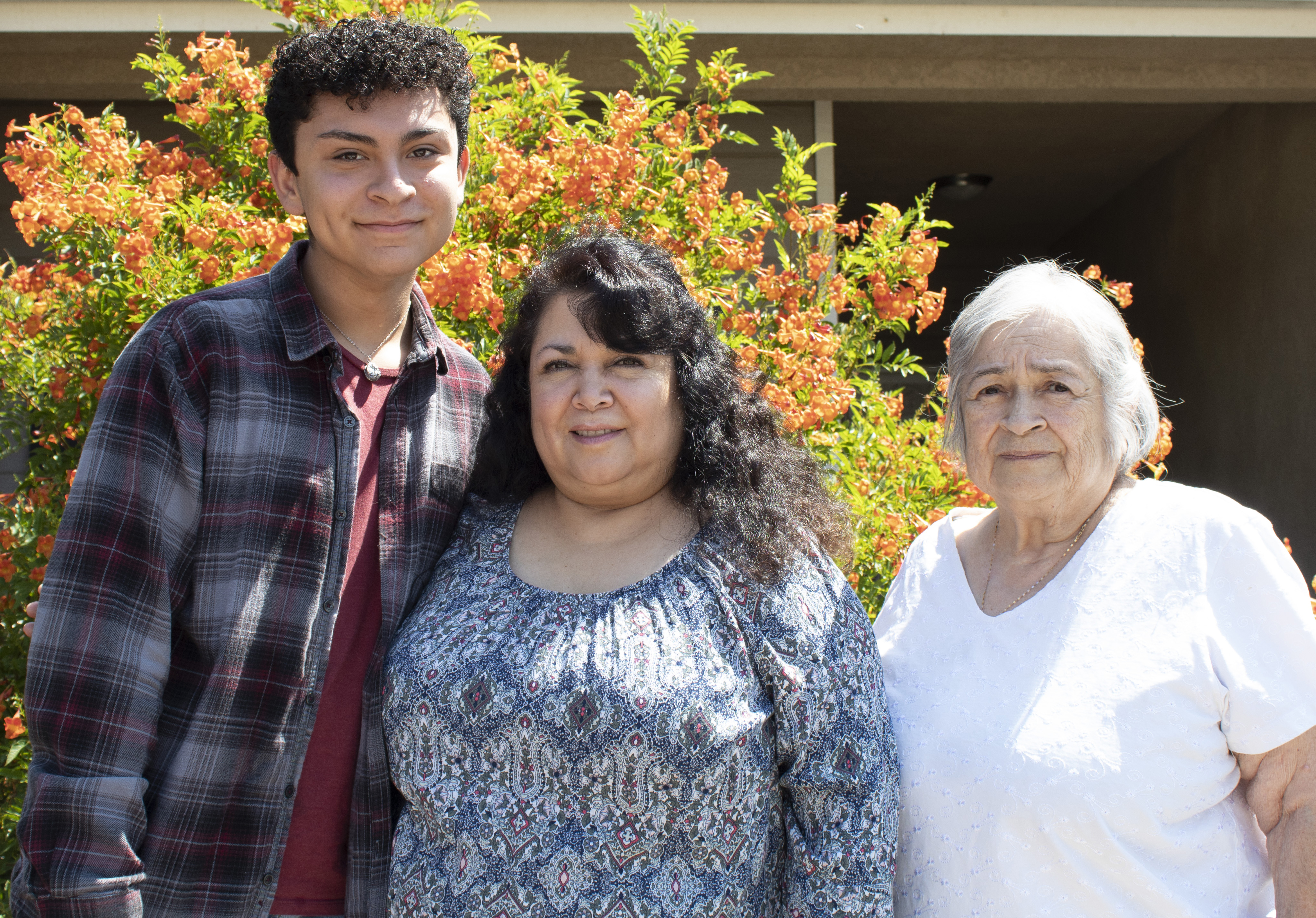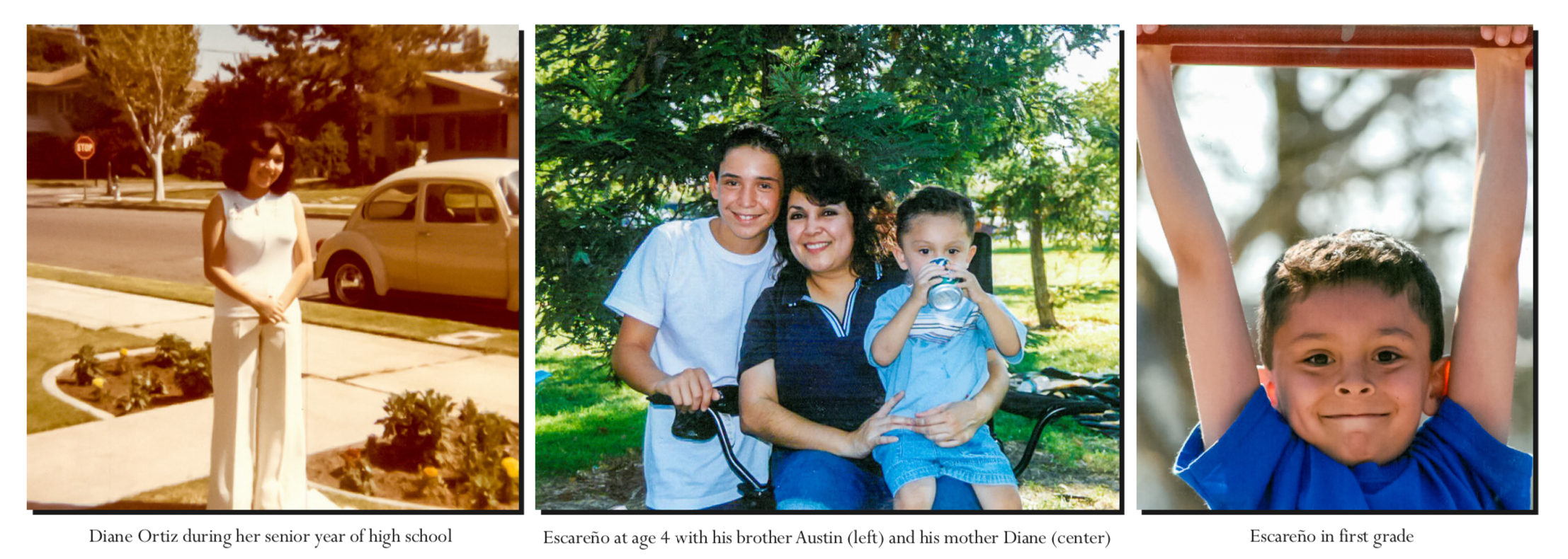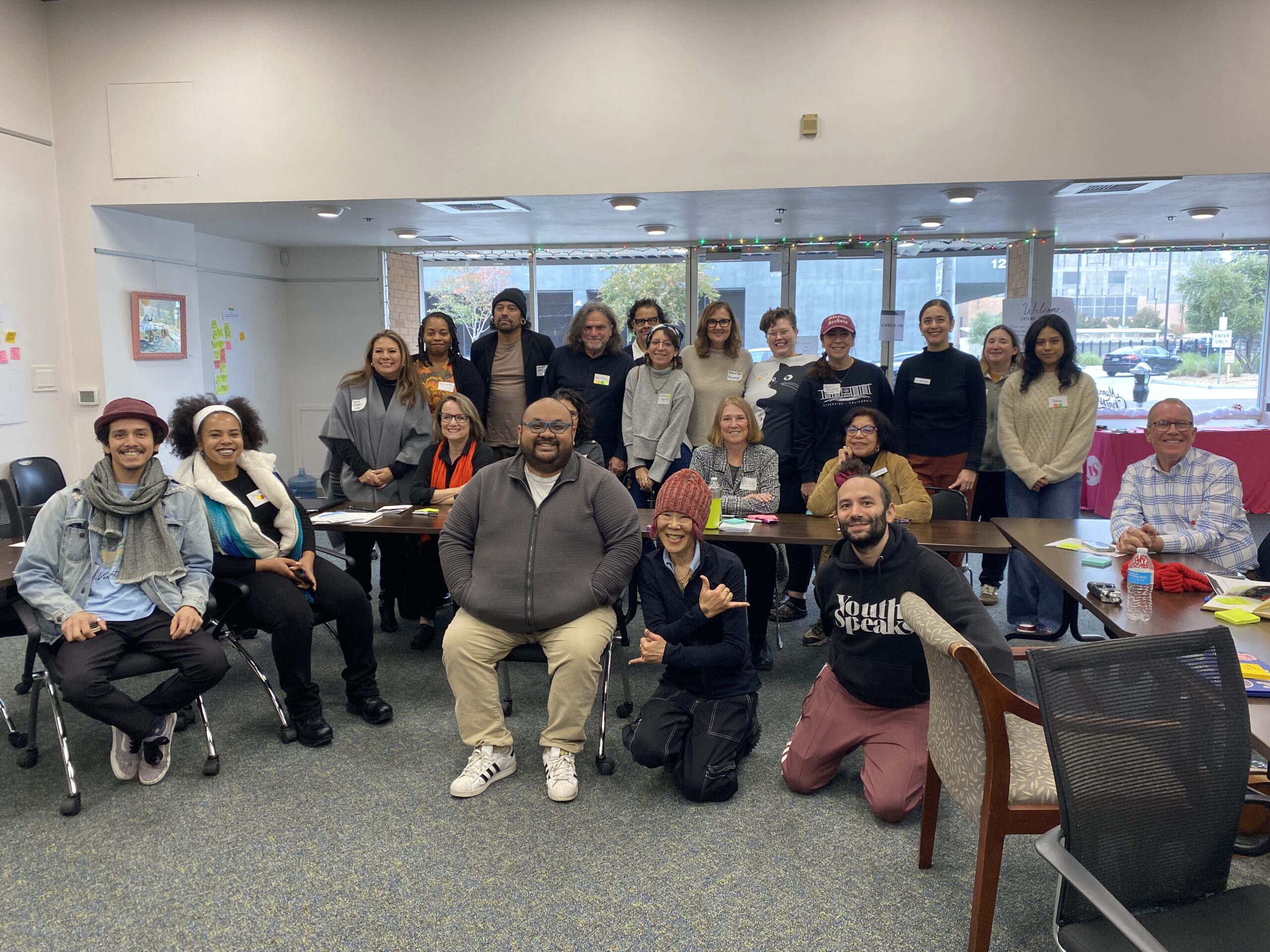Editor’s Note: This article originally appeared in The kNOw’s Fall 2019 print publication. To view the publication in its entirety click here for English or here for Spanish.

Being a member of the LGBTQ+ community comes with the daunting task of navigating a world that is too often cruel and unaccepting, but with support and tolerance, this journey becomes a little more bearable. This is why it is so important to create a world that opens its arms to the LGBTQA+ community instead of marginalizing and further isolating its members. In the past 70 years, leaps and bounds have been made in the field of LGBTQ+ rights and acceptance. However, when we make so much progress, we sometimes forget to look into the past and remember the realities we’ve left behind us. This is why I sat down seventeen-year-old Eric Escareño, his mother Diane Ortiz, and his grandmother Sally Brey; individuals from one family comprising three generations of Fresnans that are witnesses to not only how far we’ve come, but how much further we need to go.
How was the LGBTQ+ community perceived when each of you was growing up?
SB: You could not mention you were gay. You had to be in the closet in my time. I had a cousin that was gay and it was a rough time for him. Very rough. My sister and a few other cousins stood by his side. All of the [rest of the] family disowned him because he was gay.
DO: When I was in school, I remember you didn’t hear “gay.” You would hear the word … well, okay, I take that back. You heard the word gay, but it was just somebody who was different, odd or said something stupid in class. “How gay is that?” “You’re so gay.” That’s what you heard. I didn’t know anybody up until I was in high school who was gay. It was to the point where one of my best friends, who I did not know was gay, came out to me and begged me to keep a secret because he had two siblings who were both gay and the father disowned them. He could not be disowned, he said. He was not ready for that. I pretended to be his girlfriend in front of his parents….I was older than one of my brothers who was gay and I did not realize it. He used to get tormented in school. Absolutely tormented. Ridiculed. Picked on. And I did not know the reason why he was having such a rough time in school because he was such a lovely person. Just a really good person. He wasn’t out in the open, you couldn’t be out in the open back then. At all. In any way. No.
EE: I mean, now, it’s more widely accepted when we’re talking about the community in general… At least in my experience, it’s been okay. There are certain individuals who decide not to look past [someone’s] differences, and [instead] point them out, but it is what it is. It’s significantly better; we’ve come a long way, but there’s still more to go.
How was the LGBTQ+ community represented in the media when growing up, if at all?
SB: It was unheard of.
EE: There’s a lot of representation now. When we look at the different social media outlets, we can see that there’s a lot of people who are out and proud. You don’t necessarily have to be closeted anymore.
When did you realize what being gay was?
EE: It was probably around 8 or 9 when I was like, “oh, there’s something really different.” Me compared to other guys and what I found attractive, and what I was attracted to. I think that’s when it mentally clicked what gay was.
DO: I didn’t really put a lot of thought into it until my best friend came out to me. Even then, it was naive because I would say, because I had a massive crush on him…, “What do you mean you like guys? I think it’s because – have you ever had a girlfriend?” He [said], “That’s the problem Diane, I absolutely have no desire to be with a girl.” It was the first time it clicked in my head.. I just thought it was lack of experience on his part, but that wasn’t it at all. He simply just absolutely, positively had zero interest physically in girls. And then I had a girlfriend who had come out to me and then it was like, “okay, now I get it.” I think it was at that time, 18, when I truly understood.
SB: How old was I? 12. My cousin, like I told you, he was older than us. I knew he was gay. He had a tortured life. He would be beaten up all the time by other men when they would find out. Half of the family that stood behind him had to fight for him, argue for him, to protect him because he was always getting beat up really bad.

When did Eric come out to you?
DO: Well, I just one day…
EE: At the Costco gas line.
DO: Yes, and you were what? 13?
EE: I was a freshman. I was just asked by [a girl] to Sadies (The Sadie Hawkins Dance).
DO: Girls have always gravitated towards him. He has always had maintained good friendships with them. And then this young lady asked him, and I [asked], “Well, how does this make you feel?” and he [said] “eh.” I said okay, is there something you’d like to share with me because I really feel that it’s important that if there’s something you want to tell me, I love you despite whatever it is. Feel free. And he hasn’t stopped talking about it since. It was…
EE: The Costco gas line after I got asked to Sadie’s my freshman year.
DO: I remember what it was like when a guy would ask you out and you liked them, how excited you were. He didn’t display any of that. The dots all connected.
SB: I didn’t find out until [his] sophomore year. I was cooking, and he called me in and [said], “Grandma, I have something to tell you.” When he told me, I [said], “I know, Eric.” I tried to get you to look at girls, and you didn’t. I knew all the time… I don’t tell him to look at girls anymore.
Growing up and seeing how the LGBTQ+ community was treated, was there maybe anything that scared you when Eric came out?
DO: Oh, absolutely. First off, yeah, we’ve come leaps and bounds but there are still very narrow-minded, very … I don’t want to say people are bigoted, but I just honestly feel like they have a lack of understanding that a person’s sexuality absolutely has nothing to do with the person themself. I don’t know why it offends people, but it seems to bring out anger in a lot of people. So yeah, I’m always fearful for him. Even as old as he is, when he goes out, I’m fearful. I didn’t know why my brother was treated the way he was, and when I found out, I was filled with tremendous anger because I wished I had gone to school with him so I could have protected him. I’m very glad for Eric’s friends that he has because I feel better knowing that they accept him for who he is. But that doesn’t mean that when he’s out in town or out on a date or something, that the people around him feel the same. They might feel aggressive towards him. Threatened by him. Especially because he has no qualms about being who he is, which I’m proud of and I’m grateful he’s proud of who he is. He should be. But in some respects, it scares me sometimes because there are very scary people out there.
SB: Same here. Every time he goes out, I tell him to watch his surroundings and not to trust people. You have to be on guard a lot.
EE: Every time I walk out the front door, it’s always “Hijo, please be safe.”
Does it ever make you resentful that sometimes the world you’re in isn’t accepting of who you are?
EE: Of course. [Here you have] my mom and grandma, the two people I love most in the world. Whereas if you were to do the interview with my dad, he’d be giving significantly different answers. It’s rough, especially when you see the difference between two households. Over here, yes, my grandma’s tough, my mom is Christian – they’re both religious but still accepting, and they believe that the God they know loves everybody for who they are. Whereas my dad, when I came out to him, he said, “I wish you weren’t.” He doesn’t necessarily believe that gays go to heaven. It is what it is. It’s something that I’ve struggled with a lot, because you love somebody so much, you know, you want them to love you for who you are.
Is there anything that any of you want to say to someone out there who’s either struggling with their sexuality or acceptance of themselves?
DO: I would say you have to be true to who you are. My personal belief [is that] God does not make mistakes. I truly believe looking back, Eric was clearly born to be the person that he is today. He grew up going to church. It really bothers me that a kid today goes to church and is made to feel there is something wrong with them. There isn’t. You should be able to love who you love, be who you are and be proud of who you are. If your family doesn’t accept it, then you find a family who does. You find a group of friends that do. Because ultimately, you have to look at yourself in the mirror at the end of each day and you have to like who you are, love the person you’re looking at and just know that you’re accepted by the people around you. If it’s not in your household, then you find one where it is. Truly, I really believe that. I don’t think that anyone should change anything about themselves to fit a mold. In fact, we have family members that I know that if they knew Eric was gay, would have some qualms. But that’s his choice – who he wants to know, know. In this house, anybody who comes in this house or is in my presence, they will accept him or they’re not going to be part of my life. That’s just the way it is.
EE: [To] anybody who is out there and is struggling to accept themselves because of their household or because of their friend group, you have to look at both your biological family and your logical family and make sure you’re surrounded by people who are going to love you no matter what. Definitely surround yourself with people who love you. Learn to love yourself. It’s easier said than done, but over time, you realize you’re beautiful. Like my mom said, God or whoever you want to believe is up there or if there’s nothing at all, you were made to be who you are. That’s that.
SB: [I’d advise them to] surround themselves with people who love them. And those that don’t love them, it’s their loss. And they can be themselves around the people that love them… It’s everybody else’s loss for being stupid.


